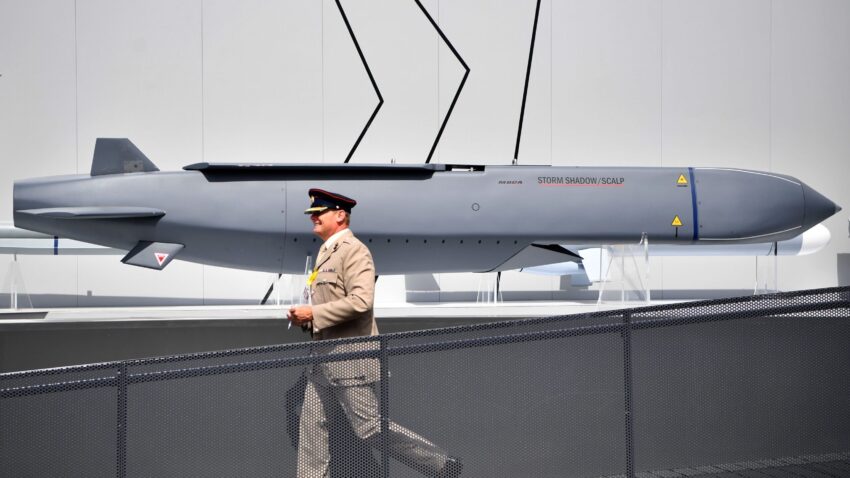A member of the military walks past a MBDA Storm Shadow/Scalp missile at the Farnborough Airshow (Getty Images)
BELFAST — France and the UK have agreed to new MBDA Storm Shadow air-launched cruise missile orders, moved closer to settling on a final design for the replacement of the weapon and pledged, for the first time, to jointly co-ordinate their individual nuclear deterrents.
The UK MoD said in a statement today that the Storm Shadow acquisitions and replacement plans fall under a “refreshed” Lancaster House defense pact, with a separate accord covering reshaped nuclear relations.
The MoD did not share how many of the cruise missiles will be ordered by either country but added that a commitment has been made by both to “launch the next phase of their joint project for both deep strike and anti-ship missiles — a step closer to selecting a final design for Storm Shadow’s replacement.”
Though not namechecked in the announcement, under the Anglo-French Future Cruise/Anti-Ship Weapons (FC/ASW) program, led at an industrial level by MBDA, the European partners are jointly developing a low observable cruise missile and a highly maneuverable supersonic munition to replace Storm Shadow — known as SCALP in French service — as well as Exocet and Harpoon anti-ship missiles. As Breaking Defense previously reported, Italy is set to join the FA/ASW project this year.
Coinciding with a visit to MBDA’s Stevenage, England facility, Sebastian Lecornu, French defense minister, said in a social media post on Wednesday that SCALP production “will resume in 2025, 15 years after our last order.”
Stressing that the weapon has been supplied to Ukraine, he added that the munition “demonstrated its effectiveness in modern high-intensity combat.”
In an address to the British parliament and ahead of the Lancaster House updated agreement announcement, French President Emmanuel Macron said that an Anglo-French summit, beginning in London today, “will enter a new stage that will scale up” defense cooperation between the two countries, with both vowing, he added, to “fully shoulder the responsibility when it comes to European security.”
Macron also said that, “Our [bilateral] industrial cooperation must also move to the next level.”
Presumably to that end, France and the UK, Europe’s only nuclear powers, also signed a declaration today stating that “the respective deterrents of both countries are independent but can be co-ordinated and that there is no extreme threat to Europe that would not prompt a response by both nations.”
France operates a two-leg air and sea nuclear deterrent better known as force de dissuasion, while the UK has set plans in motion to mirror such capability with the recent decision to acquire 12 Lockheed Martin F-35A fifth generation fighter jets, which can be equipped with B61-12 thermonuclear gravity bombs. Once fielded, the air-launched capability will complement Britain’s existing Continuous At Sea Deterrent (CASD) provided by Royal Navy Vanguard-class nuclear-powered ballistic missile submarines (SSBN) fitted with Trident 2 D5 warheads.
In March, Macron said that he was open to extending France’s nuclear umbrella to European nations, according to the UK Guardian newspaper. German chancellor Friedrich Merz has also called for discussions with France and the UK, in order to decide if Berlin should be included in nuclear sharing arrangements.
Click this link for the original source of this article.
Author: Tim Martin
This content is courtesy of, and owned and copyrighted by, https://breakingdefense.com and its author. This content is made available by use of the public RSS feed offered by the host site and is used for educational purposes only. If you are the author or represent the host site and would like this content removed now and in the future, please contact USSANews.com using the email address in the Contact page found in the website menu.








